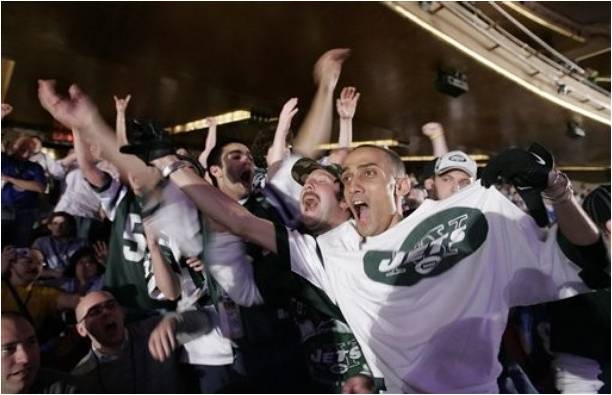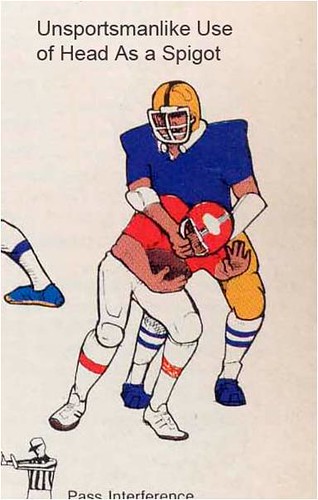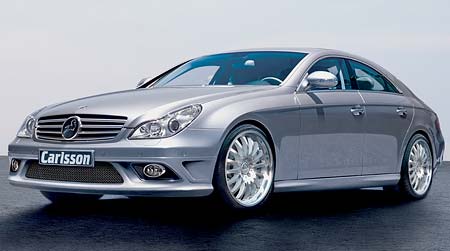
By now, you should know Joey [classified Jew name]. He writes for FD on occasion, is responsible for the ever-excellent Straight Bangin', and this week was a guest on the FD/DoC podcast. He also really likes The Hills, which figures prominently in a long interview I did with Eugene for his "The People You Don't Know" podcast. It will either make you love or hate me more than ever, or maybe send me sympathy ribbons.
Growing up in a household bereft of prescribed bedtimes or limits on television, and one where knowledge of all kinds remains the leading currency, I developed a “talent” about which most parents wouldn’t normally brag to others. But on more than just a few occasions, my parents would smile with this weird, proud amusement as they told other people that, “Joe stays up so late and likes sports so much that he can watch the same SportsCenter three or four times a day.”
That Joe--he really knows how to use his time well.
My neuroses aside, I summon this memory because it reinforces two related things: 1) I consume a lot of sports media; 2) I still have no clue as to what the NFL Draft is supposed to be about. Every year, I am left feeling the same way--the most misleading weekend in sports is that of the NFL Draft, because, honestly, it seems to be about everything but the actual sport that it nourishes. It strikes me as even more bizarre when it is juxtaposed against the NBA Draft. The NBA Draft is fun. The NFL Draft? Not really. The NBA Draft reflects the fluidity of basketball: point forwards, flex offenses, and “we like his athleticism so we took him.” The NFL Draft, meanwhile, reflects the rigidity of football: set positions, arcane formation rules, and “signability.” To be honest, it sucks.

First, think about the NBA Draft. No, wait. First, let us just get this out of the way: yes, the NBA Draft is an event, or a process, really, riddled with problems. As Hubie might warmly acknowledge, “We know this. OK?” You’re right, teams can make horrible decisions. They seem to emphasize nebulous notions of potential to the preclusion of rational thought. They ignore known entities to roll the proverbial dice on only partially formed athletes who can’t shoot but can move in multiple directions once airborne. They confuse priorities, they overly rely on individual workouts, they insist that kids who don’t care about college attend it for a year--we know all of this. ESPN even has the temerity to post graphics that say things like, “Needs to Improve: Athleticism,” as though you can just buy some at a flea market. The whole thing can lend itself to easy lampoon.
The NBA Draft is undeniably about playing basketball, though, and that redeems it. A sports fan can see this. (A sports fan stupid enough to watch Charley Steiner and Mike Patrick on a loop can see this over and over again.) The way it’s covered, the way it’s structured, the culture that surrounds it--basketball is the thing. More precisely, the focus never moves away from the on-court product, wrongly landing on the draft process, itself. Columnists and reporters frame the draft by highlighting what teams need to improve. There are pre-draft camps where prospects--brace yourselves--play the sport! Teams evaluate their needs and the available talent with immediacy. The idea is usually that the right player can make a meaningful difference, and the priority is finding the best basketball fit. Again, you can fairly criticize how these evaluations are made and where they net out, but it’s hard to impugn the motives behind them. Everything about the draft carries this air of renewal; everything acknowledges that improving the basketball is paramount.
Not unimportant, I should reiterate that the tone of the entire institution is optimistic: from the workouts, to the assessment of needs, to the handshakes with Commissioner Stern, the draft encompasses positivity about the game. Everyone is the next someone, and that someone to whom a given player is compared is rarely any old humdrum player. Parallels are drawn in the sun, with the glow of hope brightening prognostications. Further, front-office personnel, players, and fans are allowed, if not encouraged, to have fun with the whole thing. It is uncommon for a team to draft someone and foster an ensuing dialogue that bemoans how little things will change. There is a baseline understanding that the team is likely to become more competitive, even if a given draft cannot fully satisfy all needs. Enthusiasm is no stranger to the NBA Draft, and no one seems to be bothered by this. Heaven forbid that we enjoy ourselves while celebrating a game.

The NFL draft may be fundamentally about all of this, too. I’ll be fair and allow that this may be the case. Those yahoo Jets fans who show up certainly are into it. Nor will I deny that the denizens of America’s favorite gambling habit surely want to find the safety required to win a Super Bowl and help their fans feel the excitement that should come with successfully executing this search. But…it certainly doesn’t seem that way to an outsider who is very much attuned to sports culture. Instead, everything about the NFL Draft feels different: the way it's discussed, the way it’s administered, the way it’s approached by its participants. In patriotic, nationally aggrandizing Cold War terms, the NBA Draft feels like America--cheerful, excited, warm--while the NFL Draft feels like the Soviet Union--stern, severe, cold. Put another way, which event’s tenor would best accommodate Ronald Reagan eating his jellybeans and smiling with his vacant veneer of senility, and which would better serve Nikita Khrushchev as he pounded his shoe on a desk? That’s what I thought.
Peter King wrote a column this week that captures so many of these differences. Trumpeting that the Detroit Lions, picking first, will focus on "signability" when making their choice next weekend, King easily rattles off 1,000 words about how the Lions will sort out whom they draft. It’s Peter King, so it’s
Before we go on, I’ll again attempt to be fair: Maybe another team coming off a historic failure wouldn’t focus on “signability,” and instead would try to get the single best player. This could be a problem with the Lions (entirely possible), and not with the NFL. Further, the NBA doesn’t contend with signing drama because it has a rookie salary cap, so this could be an apples-to-oranges comparison. However, the NFL salary structure is fairly rigid, albeit non-codified, and the variations from year to year are not so vast. Were they, professional draft blowhards like Mel Kiper, Jr.--something else that, thankfully, sets the NBA and NFL apart--couldn’t shriek with such certainty about which players deserve “fourth-pick money” and which picks are good values. It wouldn’t make sense if everyone didn’t already know the stakes.

You can likely sense my skepticism that the absent rookie salary cap is the dispositive issue that separates the NFL Draft from its NBA superior. I am similarly skeptical (read: convinced in the opposite) that only the Lions would be choosing a top pick using actuary tables because, well, we go through this every year. It’s seemingly always about factors that are not directly connected to who runs faster, hits harder, and, ultimately, wins more. I don’t suggest that NFL teams don’t want to play better football. Rather, I’d argue that this unavoidable imperative, somehow, gets lost in the draft process itself. Not really a “sports” weekend, the NFL Draft has taken on this weird, meta component that seems to fuck up the thinking and the dialogue. The football draft is treated like a series of business transactions, and teams appear to lose sight of just picking the players who will make them best at playing football. NFL teams come off as more preoccupied with "drafting the right way," or carrying out some process preserved for its own sake, rather than the foundational issue of just improving the team. (For now, we’ll leave aside the much, much larger conversation about sports as business, which I acknowledge renders this post an incomplete exploration. I am OK with that.)
That’s not fun. Nothing about this ritualism is fun. It’s weird, and frankly annoying, that as early as February, people seriously argue about who the Seahawks should draft. Similarly, there is something nonsensical and antiseptic about the premier pre-draft event comprising Wonderlic tests, World’s Strongest Man simulations, and seemingly everything but actually playing football. The entire ordeal--and that’s what it is--feels insincere and disconnected from the sport.

Instead, the NFL Draft, not in organic harmony with the sport itself, seems to most directly connect to the larger NFL Industrial Complex that enjoys a suffocatingly tight grip on America. Everything about the NFL is taken oh so seriously, and discussed with such synthetic urgency and significance, that actual football is almost a secondary concern. Violence and primal physical competition may forever hold sway over the imagination of humanity, resulting in an evergreen appeal for the sport, but the Business of the NFL obscures this simple, innate appeal. It’s like when you apply too much dressing and drown out the natural flavors originally meant to be enhanced. Far from a compulsory exercise meant to showcase the product, improve how it’s played, and preserve the latent appeal of sport--a description which I’d ascribe to the NBA Draft as a compliment--the NFL Draft is its own industry, in effect. The draft is just about the NFL--the crest, those beer commercials, all that tailgating, and everything else that was once an attendant circumstance and now an equal to the football.
That is not really sports. That is marketing, or popular culture, even. The Masters, the Final Four, the divisional football playoff games--those are sports weekends. Those are mirthful, exciting opportunities to celebrate sports. As is the NBA Draft, a process that never loses sight of basketball, of the NBA’s loose rhythm, or the hope of the offseason. The NFL Draft, on the other hand, is an event that’s not really about sports. It’s about itself, and the self-involved seriousness of the NFL. Football becomes almost incidental as the NFL Draft drones on, polluting a perfectly innocent spring weekend with consternation about tenths-of-a-second differences, stern treatment of depth chart minutiae, and self-righteous indignation arising when teams “get it wrong.” As though the goal is to draft a certain way, not win more games.
As I said before, that sucks.















No comments:
Post a Comment